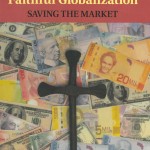With presidential elections coming up, we’ll hear a lot more about every aspect of politics, including its link to religion—especially Christianity. I would like to step back and ask a very simple question: Is it possible to derive a distinct political position or affiliation from the tenets of the Bible? My answer is “probably not.”
Trying to fit Christian beliefs into a specific political stance seems to be putting a square peg into a round hole—it just doesn’t fit. There are two major problems in trying to translate Christian faith into politics.
The first problem is which aspect of the faith do you want to emphasize?
Some parts of Christianity resonate with the right. Poverty comes from being lazy, but hard work brings wealth, according to Proverbs 10, which could be used to argue against welfare programs. God knit us together in the womb, Psalm 139, which could support an anti-abortion position.
Other parts of Christianity resonate with the left. Jesus told a rich man to sell his goods and give them to the poor (Matthew 19). After Jesus died, and his followers started the church, what did they do? They sold all their possessions and redistributed the wealth to those in need (Acts 4).
Still other parts of Christianity seem to pull us away from political involvement altogether. Jesus didn’t speak much about how Roman governance should be reformed, and when he said to “give to Caesar what is Caesar’s,” (Matthew 22) he seemed to supporting the political status quo.
Christianity presents a clear, coherent message on how we live, but it just doesn’t readily translate into any one political stance.
The second, and perhaps more daunting problem, comes with making policy. Once we know what are values are, which do we translate into government policy and which do we keep in the realm of private life?
Let’s start off with an easy one—you shall not murder (Exodus 20). I’m guessing that most Americans would agree with this, and so we pass laws against murder. Even with this seemingly clear-cut case there is ambiguity. What about killing in self-defense? Out of mental illness? Is war murder?
What about drinking? We are not to get drunk (Ephesians 5). Should this go into public policy—say outlawing alcohol? The U.S. tried that in the 1920s, and it didn’t work out so well, giving rise to organized crime among other things.
Or what about sex outside of marriage? That’s a no-no according to scripture but should we pass laws against it? I imagine that if we fined people for doing it, we might pay off the national debt in a matter of days, but I’m not sure it would be sound public policy.
These two issues—which aspects of the faith to emphasize and how to translate them into policy—have given rise to many different models of Christian involvement in politics. George W. Bush’s Christian faith led him to a very conservative brand of politics. As Jerry Park wrote about on this blog, leaders of the Civil Rights leaders took a very different political approach but, again, based on their Christian faith. Likewise, Christianity has led some into pacifism and others into Christian socialism.
Maybe my political ambivalence comes from my background. My father was a political scientist and was very involved with local politics. He was a member of the region’s Democratic central committee and, as a family, we spent more than a few weekends going door-to-door canvassing for various political candidates. After college I lived in Orange County, California, which was, and is, very conservative, and in Madison, Wisconsin (“The People’s Republic of Madison), and I saw some sense in the prevailing political ethos in both places.
I think it’s fine that people bring their religious convictions into their political decisions, as we should with every aspect of life. However, I’ve become skeptical that there is any one “right” way of doing this. Moreover, I’m uncomfortable with any message, either explicit or implicit, that suggests that “if you’re a Christian, you should be a _______ (fill in the political party).”
At this point in my life, I would say I’m a political agnostic—I just don’t know if there is one, right way to politics.











